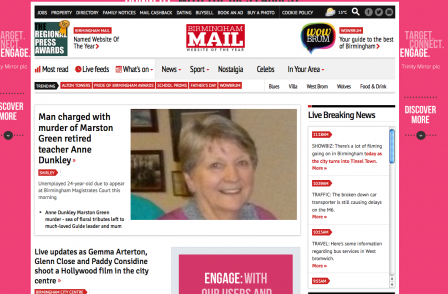
Journalists at Trinity Mirror’s restructured Midlands newsrooms will be held personally responsible for growing online audience.
Last week, the publisher unveiled the latest in a series of editorial cuts which will see 19 journalism jobs go in Birmingham and six in Coventry.
Newspapers involved include the Birmingham Mail, Coventry Telegraph, Birmingham Post and Sunday Mercury. After the latest shake-up there will be 46 editorial staff in Birmingham and 22 in Coventry.
The changes are part of the “Newsroom 3.1” plan which is being rolled out by Trinity Mirror across the UK.
In a briefing note to staff, it was explained that the plan aims to make Trinity Mirror Midlands a “truly digitally-focused newsroom”.
The memo states: “Moving forwards, every employee will need to consistently generate and deliver story ideas which reflect an inherent knowledge of their audience and what engages them.”
Journalists have been offered voluntary redundancy, but compulsory cuts will follow if sufficient volunteers do not come forward.
In a Q&A section, the briefing note explains how management expects to make its titles better with fewer staff.
“We have to continue our digital growth, make the Birmingham Mail and Coventry Telegraph better titles – all with fewer people. Our plan requires us to focus relentlessly on the content that we know gives us the most return for our effort while staying true to our values – and being ruthless about content that doesn’t”
The new plan accepts that papers like the Birmingham Mail cannot cover the city as fully as they have done in the past.
The note says: “The days are long gone when we could afford to be a paper of record and dutifully report everything that happened on our patch.”
Journalists will be given targets aimed at growing their personal online audience.
Those who fail to achieve the prescribed level of growth could be put in a “performance improvement plan” and, “in very exceptional circumstances”, would face disciplinary action.
The document says: "Of course some roles by their nature and the content they cover will drive different levels of online traffic and the levels we expect to see will reflect that. But everyone will be expected – and helped – to grow their audiences, albeit from different starting points."
The performance of journalists will “be assessed regularly, taking into account audience traffic to your content and therefore encompassing page views, unique users, local audience and other metrics”.
The new job descriptions state: “You will be expected to grow your page views and uniques in line with the growth we require as a business.”
A number of new job titles are being created as part of the Midlands shake-up. These include “content curators” whose job is to “establish, maintain and develop relationships with content suppliers in the community”.
Reporters are described as writers in the new set-up.
The job description of the writer includes:
- Deliver high quality multimedia content packages on a daily basis
- Write content in a way which engages and drives digital audience
- Provide live coverage of news events for live blogs and breaking news
- Shoot video, audio and pictures
- Source third party content where appropriate
- Build strong contacts for story-gathering within local communities
- Spend time in communities to promote brands.
The Birmingham Mail is one of the fastest-declining print newspapers in the country, with sales down 20.5 per cent year on year in 2014 to 30,597, according to ABC. In May it averaged 26,936. But it also has one of the fastest-growing websites – with daily ‘unique browsers’ up 112 per cent to 145,840.
Print sales of the Coventry Telegraph fell 14.4 per cent in 2014 to 21,773 and daily website browsers rose 60.5 per cent to 43,420, according to ABC.
Email pged@pressgazette.co.uk to point out mistakes, provide story tips or send in a letter for publication on our "Letters Page" blog
